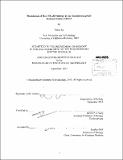Modulation of host NF-[k̳̳a̳p̳p̳a̳]B pathway by the Toxoplasma gondii secreted factor, GRA15
Author(s)
Lu, Diana, Ph. D. Massachusetts Institute of Technology
DownloadFull printable version (17.68Mb)
Other Contributors
Massachusetts Institute of Technology. Department of Biology.
Advisor
Jeroen P. J. Saeij.
Terms of use
Metadata
Show full item recordAbstract
The apicomplexan protozoan Toxoplasma gondii is an obligate intracellular pathogen that infects all warm blooded animals, including nearly thirty percent of the human population worldwide. Toxoplasma's success as a parasite owes largely to its ability to commandeer its host's immunologic and metabolic processes for its own benefit. During infection, Toxoplasma secretes a large number of proteins into the host cell. Many of these parasite factors modulate the signaling pathways of the host, including the pathway toward NF-[kappa]B activation. The NF-[kappa]B response to infection regulates the direction of host immunity, toward either the classical inflammatory or the alternative non-inflammatory pathway. Using forward genetic analysis, we have isolated the secreted protein GRA 15 that is necessary and sufficient for host NF-[kappa]B activation. We find that GRA 15 activates NF-[kappa]B nuclear translocation and transcriptional regulation in an IKK- and TRAF6-dependent manner. We additionally show that GRA 15 may complex with TRAF3. Some Toxoplasma strains activate the host NF-[kappa]B pathway much more than others. A combination of factors, including differences in expression and sequence of GRA 15, as well as other inhibitory parasite factors are responsible for conferring these strain differences.
Description
Thesis (Ph. D.)--Massachusetts Institute of Technology, Dept. of Biology, 2013. Cataloged from PDF version of thesis. In title on title page, "[k̳̳a̳p̳p̳a̳] appear as subscript lower case Greek letter. Page 180 blank. Includes bibliographical references.
Date issued
2013Department
Massachusetts Institute of Technology. Department of BiologyPublisher
Massachusetts Institute of Technology
Keywords
Biology.